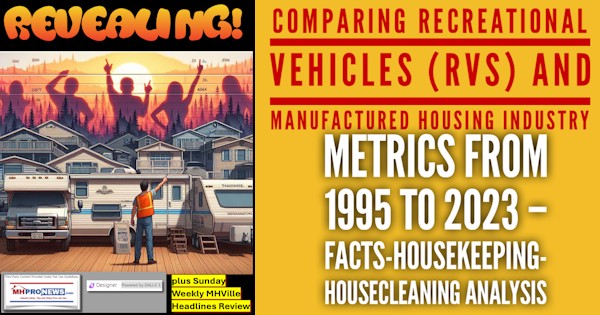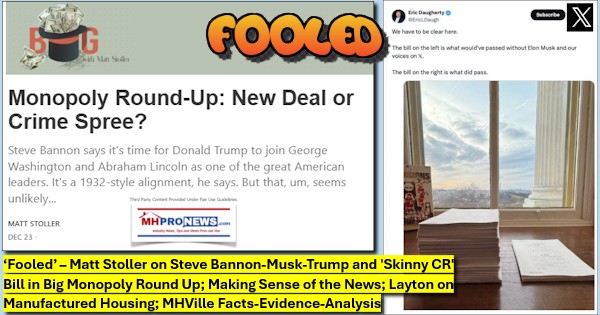
As regular and detail mined readers may know, “Making Sense of the News” is a tag line used by Washington, D.C. based WMAL, a.k.a.; “Washington’s Mall.” In an era of “Manufacturing Consent” via big media, big tech, big business, and big government, to better understand our professional reality there is a case to be made that one needs insights from both the left and the right which can then be sifted and refined into a reasonable reflection of the truth. Before diving into observations in Part I from left-leaning Matt Stoller and his latest BIG e-mailed newsletter with related facts-evidence-analysis (reviewing those with other professional insights through the lens of the diminished 21st century manufactured housing industry a.k.a. MHVille), a dotting of the proverbial i on “fooled” is warranted.
If we are candid with each other, we have all been mistaken or ‘fooled’ about people or things at various times in our lives.
Manipulation dates back to the dawn of human history and the following is evidence that points to the observation of just how longstanding manipulation is among humans.
The saying “Fool me once, shame on you; fool me twice, shame on me” was first used by politician Anthony Weldon in 1650 1234 in his book “The Court and Character of King James” to describe the court of King James234. So, close to 375 years ago, that cautionary tale against allowing oneself to be repeatedly fooled or manipulated was coined.
Those who voted for former Senators Kamala Harris (D) or Joe Biden (D) before her, or those who voted for former Governor George W. Bush (R) or the late Senator John McCain (R) before them, should ask themselves this question. As marginally free people, were we as voters misled, duped or manipulated by a combination of factors?
Hold that thought as we dip into two interesting pull quotes from former Freddie Mac CEO Donald H. Layton for the New York University Furman Center: ‘Manufactured Housing is a Good Source for Unsubsidized Affordable Housing’–‘Key Facts and Surprising Economic’ Research. As well-informed readers of manufactured housing should know, “MH” is an abbreviation Layton and others used instead of “manufactured home(s)” or “manufactured housing.”
“From around 1975 to the late ‘90s, the MH share of new single-family production averaged about 20%. It then dropped dramatically (for reasons beyond the scope of this paper) to average about 10% ever since.5 In response, MH supporters have repeatedly pushed for policies to grow MH so that it represents a larger share of new housing production. Despite this, MH has failed to break out of its approximately 10% share of new single-family construction for the last two decades.”
Layton never used the words ‘monopoly,’ monopolization, or antitrust in that part of his research into manufactured housing. Stoller and others, as regular readers of MHProNews know, have spoken about “economic termites” and oligopoly style ‘sabotage monopoly’ tactics. Layton also said this about manufactured housing.
As background, it is worth remembering that housing has long been highly politicized, which is not surprising when government plays such a major role in it,10including providing large overt and covert subsidies. Unfortunately, MH is no exception to this politicization, as in my view the published materials and research I have read – dozens of articles from housing policy organizations, academic and industry sources, popular printed and online media, and even YouTube videos – often reveal a strong advocacy approach, i.e. arguing in support of just one side of an issue, in this case to push for pro-MH government subsidies, regulations, or administrative actions.
This article aims to take a fresh look at MH to determine just how much it truly can be a large-scale natural source of additional affordable housing, whether owner-occupied or rental, as claimed by its supporters in the industry and policy community.
The full context of Layton’s narrative, footnotes and his thesis with an MHVille analysis is found at this link here.
In his reference to subsidies, the former CEO of Freddie Mac Layton perhaps unwittingly pointed to the ‘sabotage monopoly thesis’ advanced by various aspects of the Federal Reserve system linked co-authors Elena Falcettoni, James A. “Jim” Schmitz Jr, and Mark L. J. Wright’s latest installment on manufactured housing. They looked into the early successes of the mobile home industry before the HUD Code was rolled out. The shortage of U.S. housing, contends Schmitz and others in that research orbit into manufactured housing’s proven potential is linked to the factors that cause manufactured home industry underperformance in recent decades.
Stoller, Falcettoni, Schmitz, Wright, and Layton all provide useful insights and clues into MHVille’s lethargy during this U.S. affordable housing crisis, even though Stoller doesn’t mention it in what follows, and despite Layton apparently ignoring and/or missing key research that run counters to some of his explanations of the current industry realities. Let’s note the following before presenting Stoller’s headline referenced most recent BIG newsletter insights.

When almost everyone that takes the time to look into housing and report on the issues involved recognizes that zoning and finance are near the heart of the matter, and that government activities (good or bad) influence the housing landscape, it is natural to slam those involved.


Stoller’s 35,000-foot view on the broad business-political landscape of antitrust or anti-monopoly efforts in the U.S. should be considered by MHVille pros through that evidence-based prism and the related analysis in this preface and continuing in Part II.
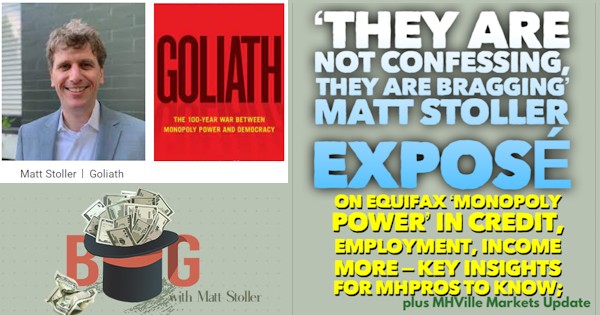
Readers should keep in mind that sharing Stoller’s thoughts, or that of anyone else, is not an automatic endorsement of all that they said or have done. Stoller’s thoughts are his. Stoller, as regular readers know tends to lean left, and as such, some of his thoughts expressed on Steve Bannon, a longtime ally and periodic wingman or surrogate for the former and future President Trump, are rather de rigueur (as in, to be expected bias) for those from the left. What follows is provided under fair use guidelines.
Part I

Monopoly Round-Up: New Deal or Crime Spree?
Steve Bannon says it’s time for Donald Trump to join George Washington and Abraham Lincoln as one of the great American leaders. It’s a 1932-style alignment, he says. But that, um, seems unlikely…
Matt Stoller | Dec 23
Today’s round-up for paid subscribers is chock full of monopoly-related news, including how Amazon massively screwed up its Hollywood MGM purchase, a cringe-worthy music video released by Blackstone, a below-the-radar fight showing just how bad Kamala Harris’s instincts really were, and some positive news on the antitrust case against NASCAR.
But I want to start with the latent conflict between Elon Musk and the economic populists on the right, one that became very clear after the funding fight last week in Congress. A key spokesman for the populists is Steve Bannon, an assertive organizer who has built a global anti-establishment movement based on appeals to nationalism and working class solidarity. Bannon matters. He helped recruit Donald Trump, structure his campaign, organize some of his policy architecture, including the use of antitrust to go after Google and Facebook. So when Bannon talks, I try to listen. And he just gave a remarkable interview to journalist Dave Weigel of Semafor on what he sees as a possibility for the next four years.
To Bannon, the second election of Donald Trump “is a 1932-type realignment, if we do this right. Look at the demographics that got us here – black, Hispanic, white, working class, all of it. If we deliver for these people, and I mean deliver in a big way economically, then this is a coalition that could last for 50 years.”
That, of course, is a big if. Weigel pressed him on what it would mean to deliver, and Bannon said that the GOP has to change. “In President Trump’s house, there are many mansions. You’re going to see a fight from the populist right.” He seeks to “break that mindset that stock buybacks are fine, that crony capitalism is fine, and the tax breaks for the corporations are fine.” If that doesn’t happen, then the GOP will “squander a unique moment in history.”
And yet, what I saw last week, in a weird Congressional fight, was very much crony capitalism and the orthodox Republican establishment in operation. There’s a lot of bullshit flooding the public discourse, so the backstory here is key. Over the last twenty years, largely because Mitch McConnell built a Congress based on saying no to most policymaking, nearly everything that gets into law now gets jammed into last-minute must-pass bills. It’s not the ideal way to make laws, but it also doesn’t much matter, since most stuff put into these bills has wide support anyway and gets stuck in there because it’s the only way to get it through Congress. So last week, as usual, Congressional leaders cut a deal to put a bunch of legislation into one giant bill that also funded the government.
To be clear, all of this legislation was consensus stuff, had passed out of committees, usually out of one legislative chamber. It included bills like the Youth Poisoning Protection Act, which bans selling substances with a high concentration of sodium nitrite to kids. Kids use that stuff to kill themselves, and Amazon wouldn’t stop selling it. Passing a law to stop them isn’t controversial. There was a lot in there like that, bans on junk fees for hotels, money for breast and cervical cancer early detection, deepfake porn protections, controls on pharmacy benefit managers, and so forth.
But then, Elon Musk, who is worth $400 billion at this point, ginned up a storm, and demanded that the Republicans renege on the deal, which they did. By Friday, Congress removed most of the legislative text and passed a skinnier bill. This kept the government open, and punted key decisions for a few months. Most of the legislation taken out of the funding bill will likely be passed in the new Congress – they aren’t really controversial. It also isn’t much different in terms of funding amounts, it really just removed stuff like the sodium nitrite rule. At some level, it just sounds aesthetic, the kind of process trolling that no one actually cares about. Pass smaller bills! Move things one at a time! Be transparent!

But there was one particular rule that got eliminated that did matter to Musk, which is tighter screening on outbound investment to China. And it’s possible that the real game was to do a lot of distraction by getting rid of a lot of useful legislative text, in the hopes that no one would notice the real provision that Musk wanted eliminated. Rep. Rosa DeLauro, a populist Democrat, observed that Musk had just broken ground on a “new $200 million factory to manufacture large batteries critical to its electric vehicle supply chain” in Shanghai, and that’s precisely the kind of investment that would be subjected to more screening under the new law. Musk’s response was to call her ugly, to distract from her point.
It is hard to square Bannon’s circle on economic populism, with figures like Musk so pivotal. And Bannon knows that, telling Weigel that he and Musk “are disagreeing on just about everything, particularly China.” Yet, Bannon supports Musk, broadly, seeing him and his DOGE committee as useful in moving massive spending cuts “in year one.”
And Musk, while a unique figure, isn’t an anomaly. Here’s the Financial Times, reporting on a remarkable shift that could happen in Pentagon contracting.
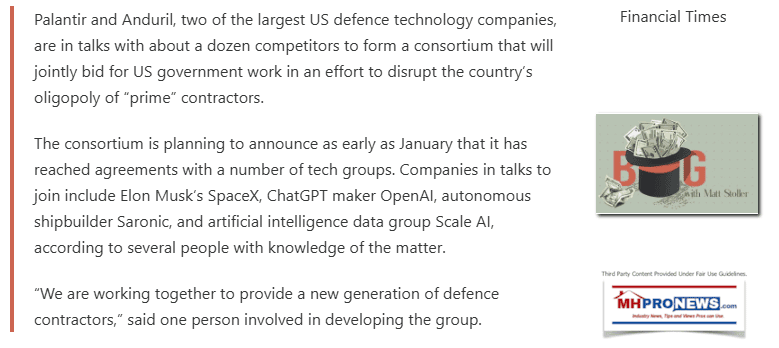
The upside of a consortium is that it’s true the big prime contractors are terrible, and we do need a new generation to challenge them. And that’s nothing to dismiss, SpaceX launches its rockets significantly more efficiently than United Launch Alliance, a lumbering alliance of Lockheed and Boeing. The downside is twofold. First, this could just be naked bid-rigging by Trump-connected contractors, and that doesn’t necessarily improve the situation. And second, the real problem with our military is that in the 1990s, policymakers decided that the armed services existed to serve contractors, not the other way around. And having new contractors with political power doesn’t challenge that fundamental premise.
Multiply this story across the government, and that’s what the Trump administration will likely be, a bitter fight with corrupt entrenched interests, by even more corrupt but not yet entrenched interests. As Trump ally Bill Ackman noted in his brief review of a book by two Palantir founders, the goal is to fuse government and big tech for national security purposes.
As bad as that sounds, most Americans will give these energetic, confident, and wealthy conservatives a chance, as that’s what they voted for. So we will see fireworks very quickly. One thing Bannon said is clearly true: “The first six months of the second term is going to be politics like you’ve never seen before.”
And after the paywall, I wrote up how Amazon embarrassed itself in its purchase of Hollywood studio MGM, put a spotlight on some out of the way bad decision-making by Kamala, and highlighted a bit of good news on the antitrust case against NASCAR. Also, Blackstone had its staff sing country music songs about alternative investments. For real…
Part II – Additional Information with More MHProNews Analysis and Commentary
In no particular order of importance are the following observations.
1) Confirmation bias, ego, bias in general, paltering, spin, and other factors can have the effect of making it difficult for someone to see themselves and their interpretation of events in an objective fashion. For example. Senator Elizabeth Warren (MA-D), pretty far left for many, is bewailing the influence that Elon Musk is having on behalf of Trump and his agenda. Warren via left-leaning MSNBC posted on X.
NEW: Elizabeth ‘Pocahontas’ Warren fumes over how close Elon Musk and Donald Trump are, suggests Elon is only working with Trump to get richer.
Seeing this woman mad makes me incredibly happy.
The comments come after Warren was trolled for contributing absolutely nothing to… pic.twitter.com/nqHiJtCFZ6
— Collin Rugg (@CollinRugg) December 18, 2024
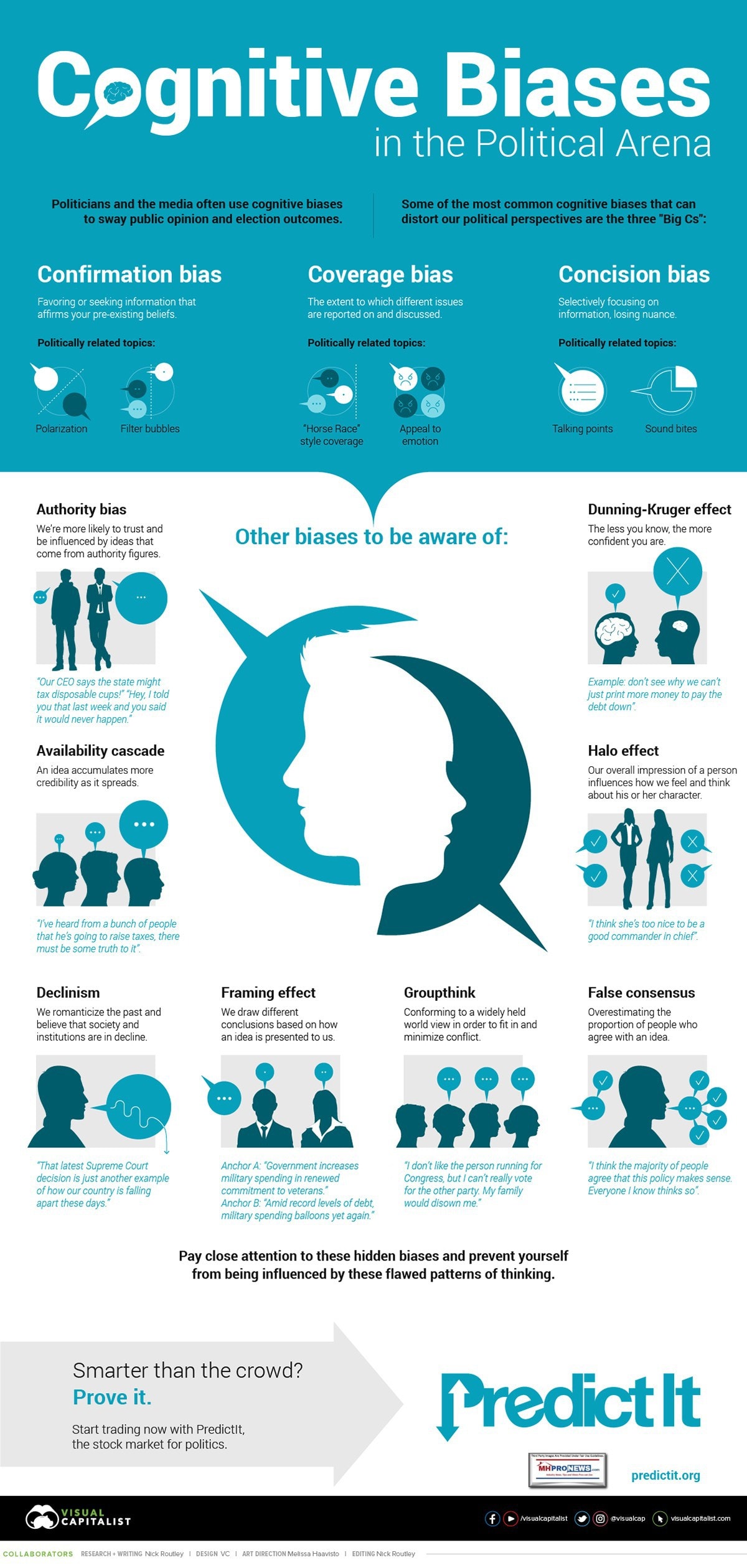
2) There are any number of observations that might be made about Warren’s remarks (we’ll get to Stoller’s insights shortly). For instance:
- a) Musk may or may not be the world’s richest man. The richest could be Vlad “the Impaler” Putin, as CNN once noted and then promptly forgot. But in fairness, Part of Warren’s point is to draw attention to Musk’s wealth and apparent conflicts of interest.

- b) But as is often the case in matters that involve Washington, D.C., Senator Warren (D) is pointing a finger while three digits are pointing back in her and her party’s direction. Was Musk okay in Warren’s view before he bought left-leaning Twitter, made it X, and was a self-declared moderate Democrat? Is it okay to be a multi-millionaire senator from a left-leaning state, but not okay to be a billionaire who supported Donald Trump? Billionaires and corporate interests, per reports, overwhelmingly supported Kamala Harris (D) and other Democratic candidates over Trump and Republican ones. See some hypocrisy, anyone?

- c) Warren is among those Democrats who have been known to talk a tough antitrust language for years, as MHProNews/MHLivingNews have reported. But what did she and her fellow Democrats do while they had both houses of Congress and the White House? Some historic perspective is useful.

Uploaded May 30, 2019

Uploaded on May 25, 2019
d) Billionaires and the corporate class widely supported Democrats over Republicans in 2016, 2020, and 2024, per third-party research.
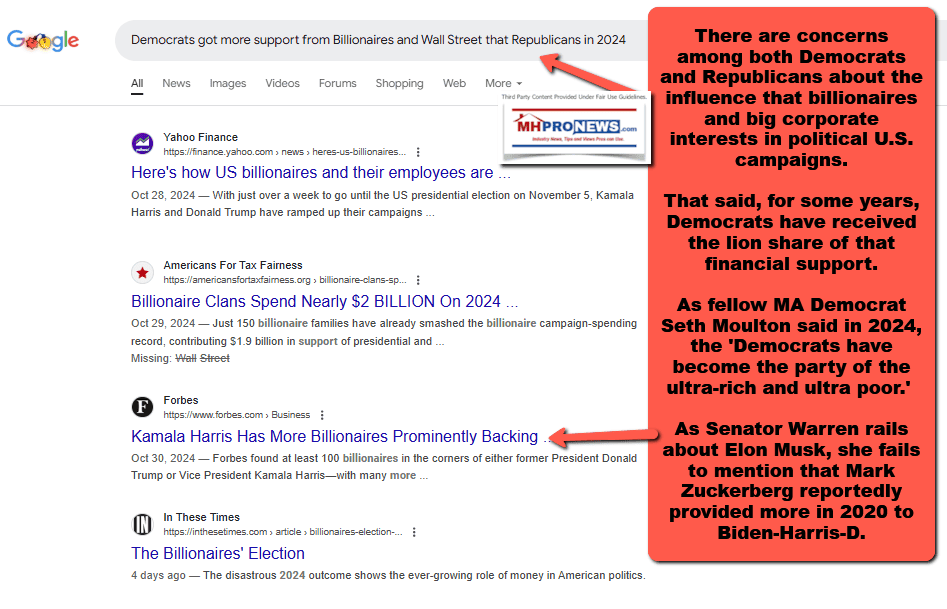
That said, for some years, Democrats have received the lion share of that financial support.
As fellow MA Democrat Seth Moulton said in 2024, the ‘Democrats have become the party of the ultra-rich and ultra poor.’ See: https://www.manufacturedhomepronews.com/democratic-congressman-seth-moulton-ma-d-said-democrats-are-party-of-ultra-rich-and-the-ultra-poor-rigged-system-revelations-facts-and-analysis-plus-sunday-weekly-mhville-headlines-rec/
As Senator Warren rails about Elon Musk, she fails to mention that Mark Zuckerberg reportedly provided more in 2020 to Biden-Harris-D
MHProNews Note: depending on your browser or device, many images in this report can be clicked to expand. For example, in some browsers/devices you click the image and select ‘open in a new window.’ After clicking that selection, you click the image in the open window to expand the image to a larger size. To return to this page, use your back key, escape or follow the prompts.
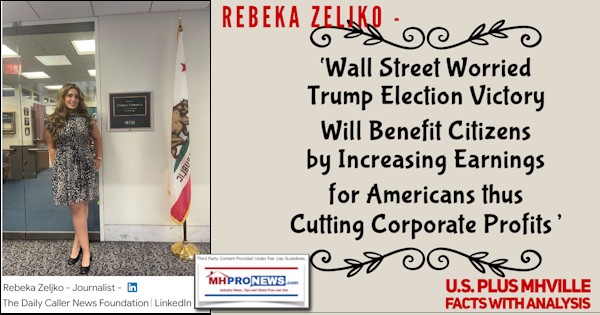
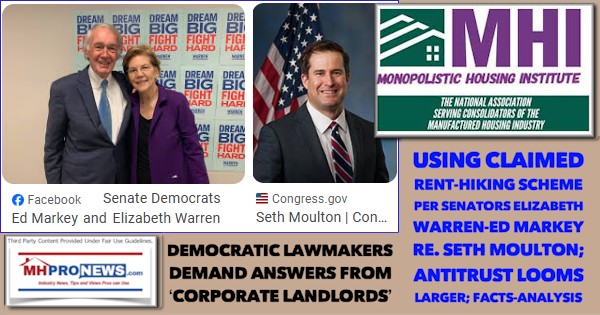
e) And suddenly, leftists like CNN’s Van Jones and possible 2028 Democratic presidential hopeful, Representative Alexandria Ocasio Cortez (AOC-NY-D) are talking about our country being an oligarchy run by oligarchs and unelected officials. Where CNN’s token conservative, Scott Jennings had a pithy and insightful reply.
VAN JONES: We’re dealing with an oligarchy with Elon Musk here.
SCOTT JENNINGS: If you’re concerned about unelected officials running the government, I invite you to review the last 4 years of Biden.
— Eric Daugherty (@EricLDaugh) December 21, 2024
911 on X posted an example of the oligarchy on the left on response to Congresswoman AOC.
AOC says we have an oligarchy running America. Is she referring to her sugar daddy George Soros? pic.twitter.com/dxYsl7vncy
— Breaking911 (@Breaking911) December 22, 2024
d) Bane on X pointed to a similar fact-set MHProNews reported on some 4 years ago in the article linked below his related remarks.


e) Warren Buffett, a longtime supporter of Democrats and the left and an oligarch in America and in manufactured housing specifically, admitted as much in 2006 and 2011. The facts have been there for all with the eyes to see.


We can all come to a realization of what is true and real, but we do so at different times and for different reasons.
3) With that backdrop, Stoller said the following (see Part I for full context).
But I want to start with the latent conflict between Elon Musk and the economic populists on the right, one that became very clear after the funding fight last week in Congress. A key spokesman for the populists is Steve Bannon, an assertive organizer who has built a global anti-establishment movement based on appeals to nationalism and working class solidarity. Bannon matters. He helped recruit Donald Trump, structure his campaign, organize some of his policy architecture, including the use of antitrust to go after Google and Facebook. So when Bannon talks, I try to listen. And he just gave a remarkable interview to journalist Dave Weigel of Semafor on what he sees as a possibility for the next four years.
To Bannon, the second election of Donald Trump “is a 1932-type realignment, if we do this right. Look at the demographics that got us here – black, Hispanic, white, working class, all of it. If we deliver for these people, and I mean deliver in a big way economically, then this is a coalition that could last for 50 years.”
a) So far, so good. Stoller is correct in saying that is a “big if” below, as the funding of the continuing resolution (CR) bill revealed. There are those in the GOP that nationally syndicated right-leaning Dan Bongino says are secretly Democrats, but Bongino exaggerates to say that there no Democrats who are secretly Republicans.
That, of course, is a big if. Weigel pressed him on what it would mean to deliver, and Bannon said that the GOP has to change. “In President Trump’s house, there are many mansions. You’re going to see a fight from the populist right.” He seeks to “break that mindset that stock buybacks are fine, that crony capitalism is fine, and the tax breaks for the corporations are fine.” If that doesn’t happen, then the GOP will “squander a unique moment in history.”
And yet, what I saw last week, in a weird Congressional fight, was very much crony capitalism and the orthodox Republican establishment in operation.
b) Stoller just made part of the point noted from the Bongino reference above. Both major parties have deep pockets backing candidates. While it is fair to say that Democrats get the lion share (see the illustration above and below), it is also fair to say that some in both parties (think outgoing Senator Mitch McConnel (KY-R) as a possible example) are willing and able to play both sides.
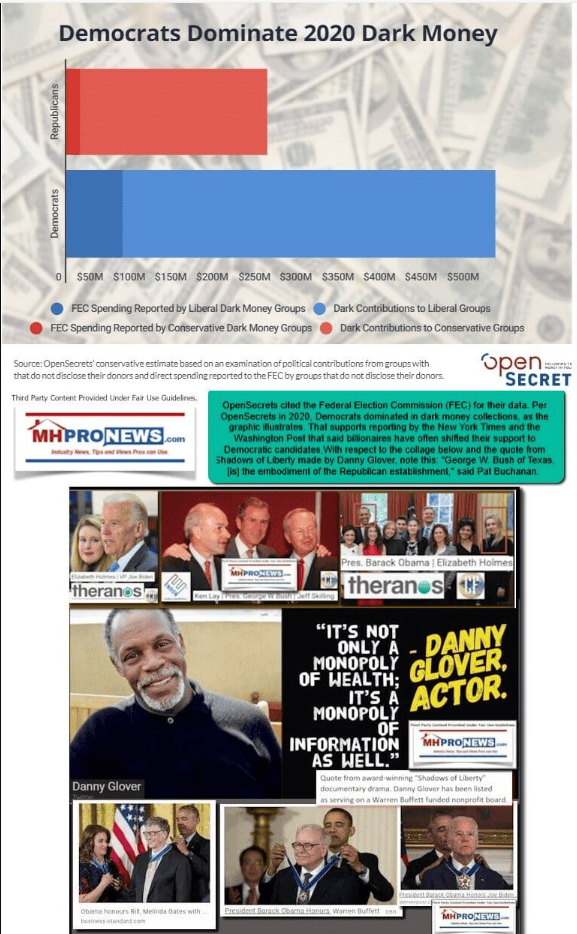
There’s a lot of bullshit flooding the public discourse, so the backstory here is key. Over the last twenty years, largely because Mitch McConnell built a Congress based on saying no to most policymaking, nearly everything that gets into law now gets jammed into last-minute must-pass bills. It’s not the ideal way to make laws, but it also doesn’t much matter, since most stuff put into these bills has wide support anyway and gets stuck in there because it’s the only way to get it through Congress. So last week, as usual, Congressional leaders cut a deal to put a bunch of legislation into one giant bill that also funded the government.
…
But then, Elon Musk, who is worth $400 billion at this point, ginned up a storm, and demanded that the Republicans renege on the deal, which they did. By Friday, Congress removed most of the legislative text and passed a skinnier bill. This kept the government open, and punted key decisions for a few months. Most of the legislation taken out of the funding bill will likely be passed in the new Congress – they aren’t really controversial. It also isn’t much different in terms of funding amounts, it really just removed stuff like the sodium nitrite rule. At some level, it just sounds aesthetic, the kind of process trolling that no one actually cares about. Pass smaller bills! Move things one at a time! Be transparent!
c) Stoller and Warren railed in their own way against Musk, but did so without the “backstory” that Stoller admits is the key to avoiding the “bullshit flooding the public discourse.” In a narrow sense, MHProNews would agree, there is a lot of BS that floods the public discourse. As a result of much of the public increasingly tuning into that reality, trust in mainstream media, perhaps particularly left-leaning mainstream media, is diminished.

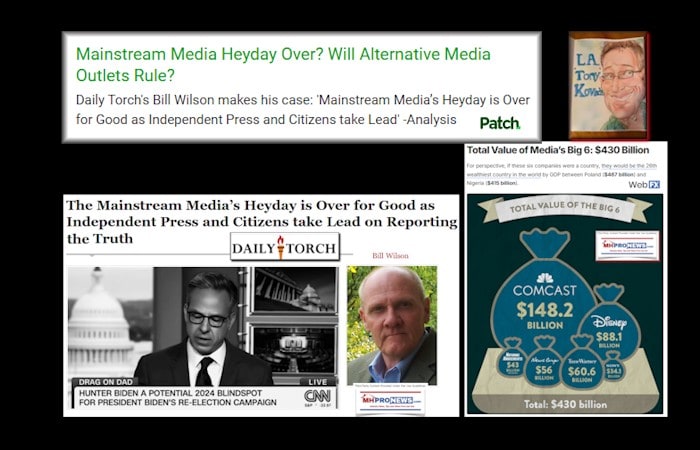
4) For an objectivity and reality check, Stoller, Warren and others in that orbit should view, or view again, the groundbreaking research presented by mostly other leftists in the still relevant Shadows of Liberty. That BS that Stoller is worried about flows through the channels and platforms that collectively largely favor Democrats. See the illustration below the link to the full-length with transcript and annotated version of Shadows, linked below.

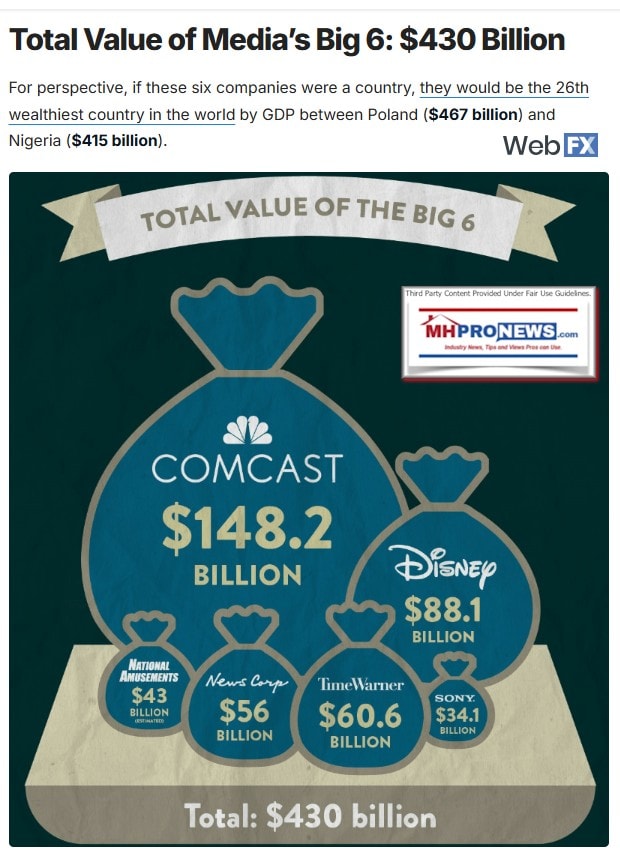
5) Leftists for years have railed against Fox News, which has been drifting left under the succession plan of Rupert Murdoch to his more pro-Democratic son and daughter in law. But a glance up at that illustration reveals that NewsCorp is smaller than Disney (think ABC News), smaller than Comcast (think NBC, MSNBC) and so on. Yes, podcasts at the moment seem to be leaning more towards the right. But isn’t that in part a reaction to the media dominance that the left has held for so long? Bill Wilson and others seem to think so. This is a good place to remind readers and inform new ones that MHProNews’ leadership are political independents and have been for over a dozen years. It is necessary to get the sense of what both major parties camps are saying and doing in order to begin to sort out what is real, or what is – as Stoller said – merely a flood of BS.
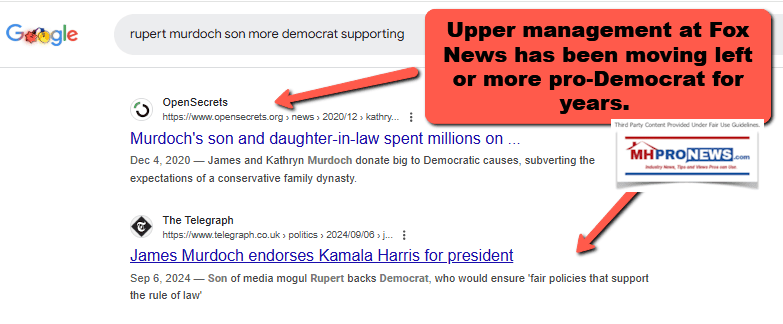

6) So, bias noted and aside, what does Stoller tell us in MHVille? What did the others cited above inform truth seeking and/or independent-minded manufactured housing industry professionals? Let’s look. In no particular order of importance.
- a) Trump will have to deal with issues within the GOP. No surprise there, as several members of his party hobbled Trump 1.0. There will apparently be some of that subversion among the GOP in Trump 2.0. Trump may be better equipped to deal with that this time around, but as with all things, time will tell.
- b) Bannon and Stoller are correct in saying that Republicans have a unique generational opportunity, but that is dependent on a BIG IF. That big if is if Bannon-minded souls in the GOP and Trump 2.0 hold sway in the White House and Congress once Trump and Senator and VP-Elect J.D. Vance (OH-R) are sworn in. As some on the right have observed, Vance may become the future face of the Republican Party if this more populist-MAGA-America First stance holds. When and how Trump provides lift to Vance, or someone like Don Jr., Vivek Ramaswamy, or other loyalists in the MAGA movement remains to be seen as his presidency evolves, Trump’s life and good health being an obvious condition to consider.
- c) Stoller, Falcettoni, Schmitz, Wright, and Samuel Strommen, among others, have generically or manufactured housing specifically done the industry a favor by pointing out the role that ‘sabotaging’ or ‘economic termites’ has on the industry. While Stoller declined a prior suggestion by MHProNews to peer into manufactured housing as an interesting case study for his ongoing research into antitrust and oligopoly style monopolization, it is certainly possible that he may do so.
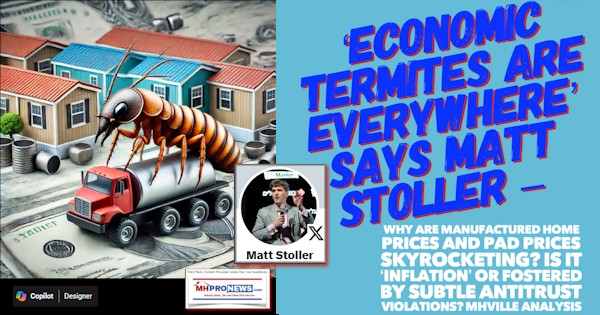
- d) Research by Layton, the Urban Institute, Harvard’s Joint Center for Housing Studies, the Niskanen Center, Lincoln Institute, Pew, HUD, and others into manufactured housing are all providing various theses that shed partial if imperfect light on some key facts. Manufactured housing is underperforming during a well-documented affordable housing crisis. That underperformance follows legislation that the Manufactured Housing Association for Regulatory Reform (MHARR) championed for years, and which the Manufactured Housing Institute following a shakeup in leadership in the late 1990s decided to join forces with them and enact. Stoller was correct in noting that for some years, it is often some must pass bill in Congress that gets loaded down with a bunch of other legislative and/or funding items.









- e) What might make someone like Stoller more interested in shing a light on HUD Code manufactured housing is if he was properly introduced to just how curious the supporting facts in favor of manufactured housing are vs. the lived reality of, arguably due in part to what he calls “economic termites,” but what Falcettoni, Schmitz, Wright, et al call sabotaging monopoly tactics.


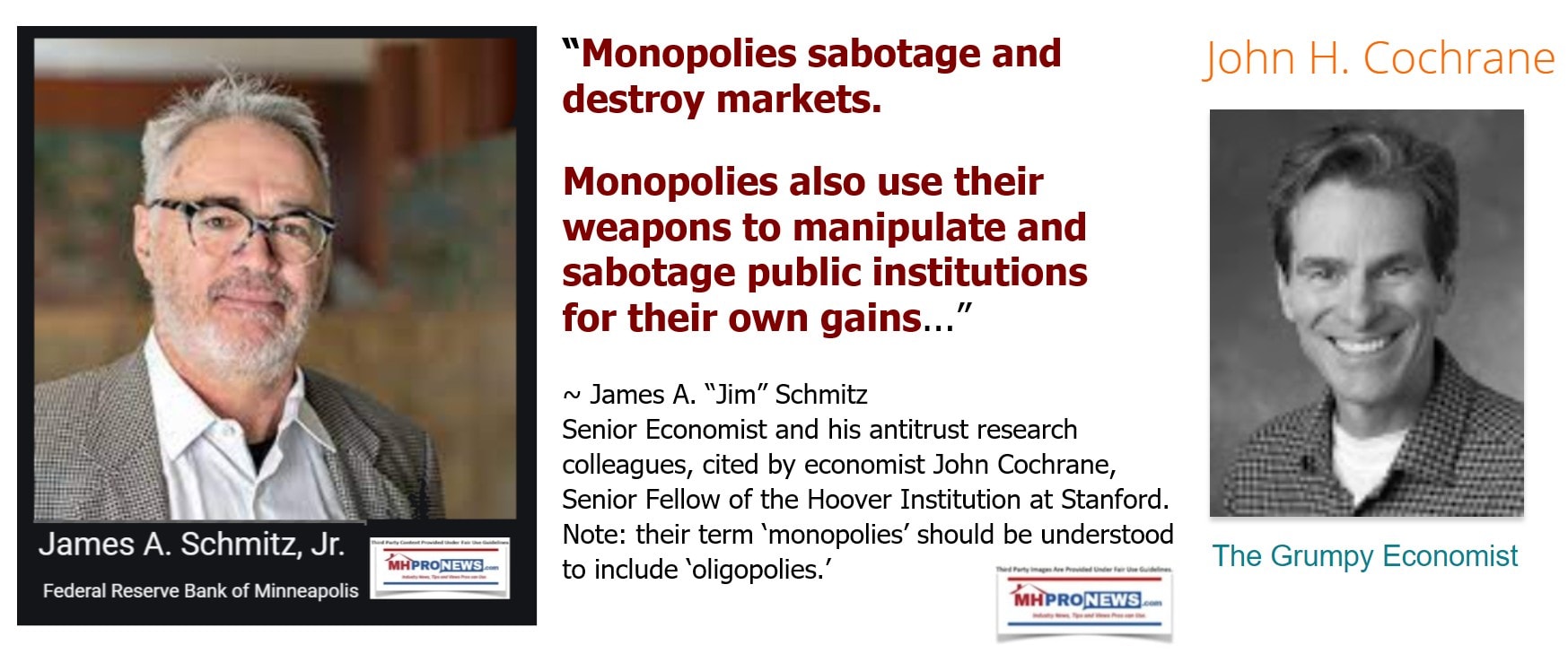

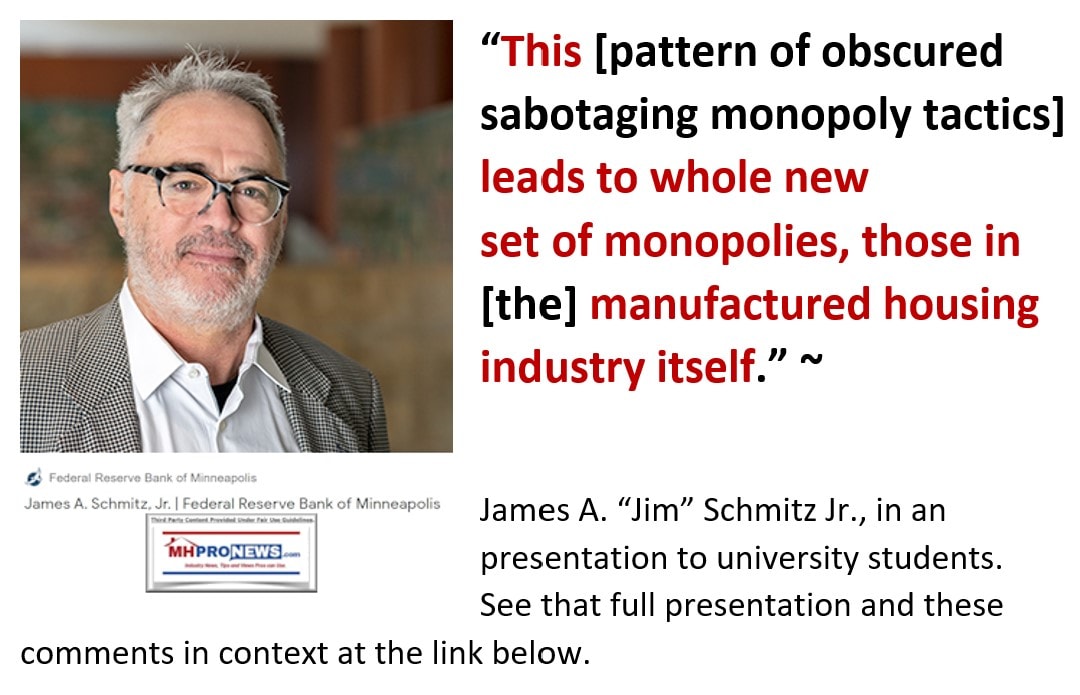
- f) What is ignored by too many on the left is the consequences for working and middle-class Americans in Trump 1.0. Here is how CNN expressed it, followed by Fox Business on the same topic. The Trump tax cuts benefited the working and middle class. It also juiced the economy, which may well have benefited the Biden-Harris (D) regime which may have stalled out under the waves of spending for their favored causes and on millions of migrants and foreign wars.
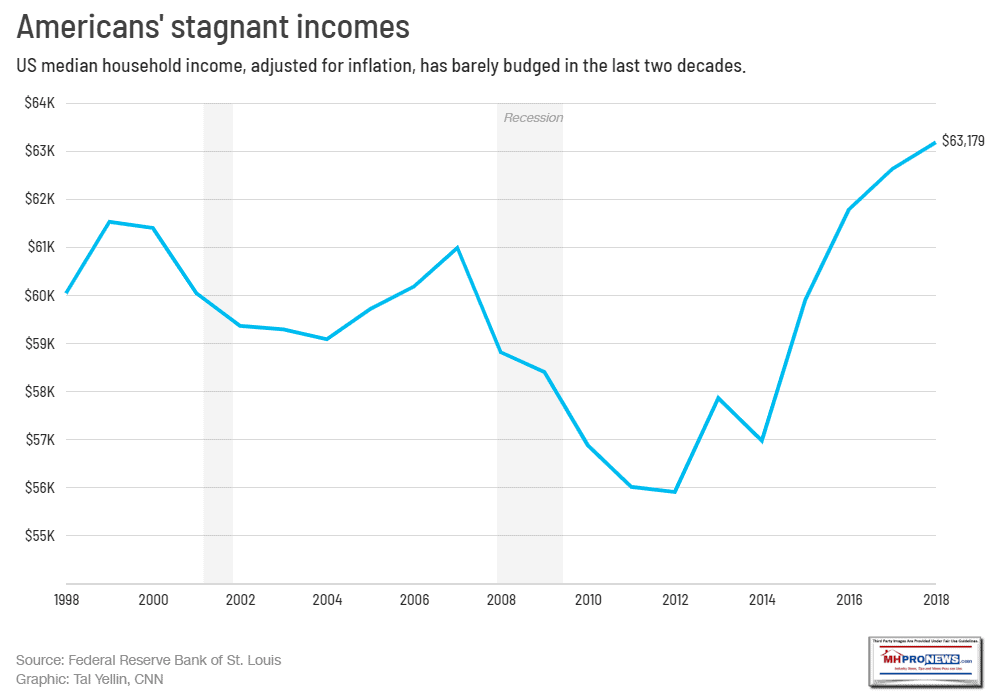
CNN is not a pro-Trump media outlet, but using Fed data, their graphic reflects the upward trend of income following President Trump’s enactment of the tax cuts and jobs act. It is worth noting that Democratic President John F. Kennedy Jr. did similarly. Income and productivity also rose. During the Reagan Administration, former Democrat turned Republican Ronald Reagan cut taxes with a similar outcome as Presidents Kennedy and Trump. Facts matter.
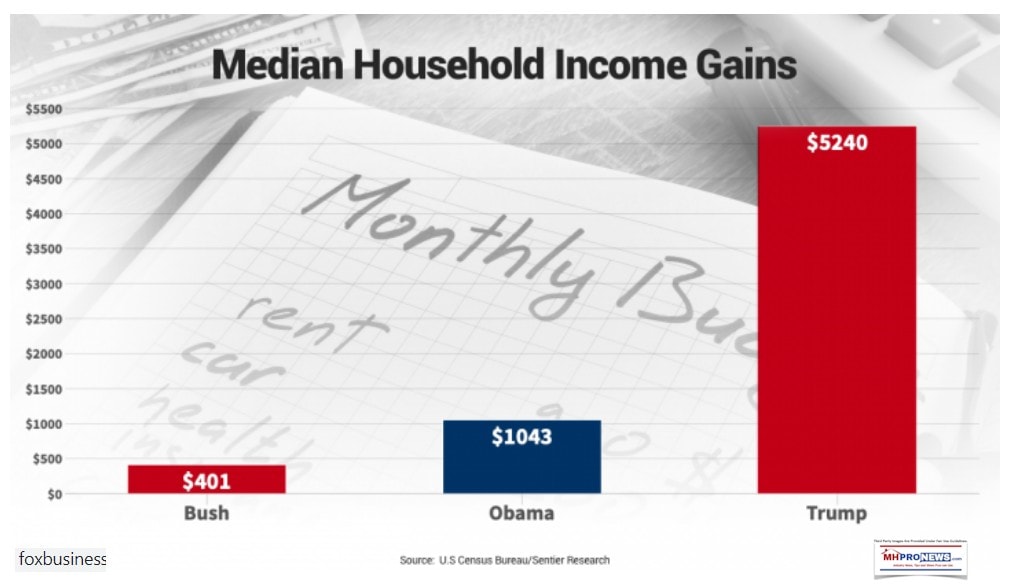
g) This evidence is often omitted by observers on the left and never-Trumpers on the right.

h) The history of the 21st century is one of Republican presidents passing tax cuts, and Democratic administrations largely and routinely kept those tax cuts in place.


7) Also ignored by many on the left is the fact that labor leaders are often Democratic leaning. But given that those same big corporate and billionaire Democratic oligarchs, and Elon Musk, have big interests in Communist China and other countries, labor has been undermined for years regardless of what Democratic policies have postured. Trump is the one who has made that a central issue, as Stoller pointed out that Bannon stresses. No less a figure on the left than multiple Democratic presidential nomination hopeful Senator Bernie Sanders (VT-DS) said something similar to what Rep Moulton did. Democrats have embraced the wealthy and elites, even if slyly and in a de facto fashion. As more and more voters see that reality, millions of ‘traditional’ Democratic voters abandoned Dem candidates by voting for Trump-Vance (R) and so-called MAGA Republicans. This is the reality that Steve Bannon is talking about and that Stoller said could become a multi-year reality, IF that coalition holds and delivers for the working- and middle-class voters.

To recall the headline underscored phrase of politician first used by politician Anthony Weldon in 1650: “Fool me once, shame on you; fool me twice, shame on me.” Democrats tried to hoodwink or “fool” millions of their voters one time too many. Will it stick? That is to be determined during the course of Trump 2.0, especially the next two years and the 2026 midterms. But Stoller is right in pointing out that Bannon has a point. If the Trump and MAGA Republicans hold fast to their stated principles, plans, and promises, it could be that several years of election cycles could favor this new “MAGA” GOP. If some in the GOP don’t torpedo themselves. So, the fat CR being gutted in favor of a skinnier CR was meaningful.
8) What Stoller didn’t mention is the ‘enforce the law’ side of Trump’s mantra. Trump has not made any specific manufactured housing remarks in some time. But according to MHARR, a staffer in the Trump White House in 2019 per MHARR said that they were aware of enhanced preemption under the Manufactured Housing Improvement Act of 2000 and were ‘looking at it.’ Pragmatic Trump may, just may, pop up and surprise some on that topic, perhaps through the work of his nominee, Eric Scott Turner. As MHARR said at that time:
“The same communication calls on HUD to exercise its authority under the enhanced federal preemption language of the Manufactured Housing Improvement Act of 2000 to either eliminate or limit such baseless restrictions. And, indeed, in response to an inquiry from MHProNews Publisher L.A. Tony Kovach, it appears that the specific issue of federal preemption will be “on the table” in this process.”


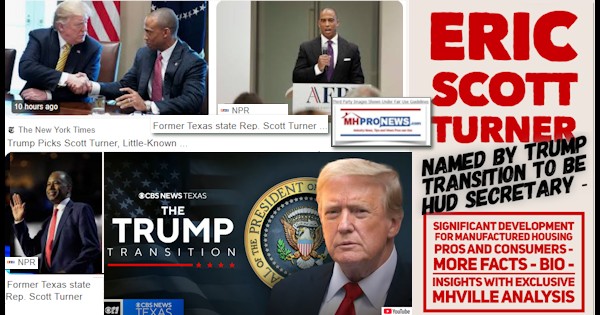
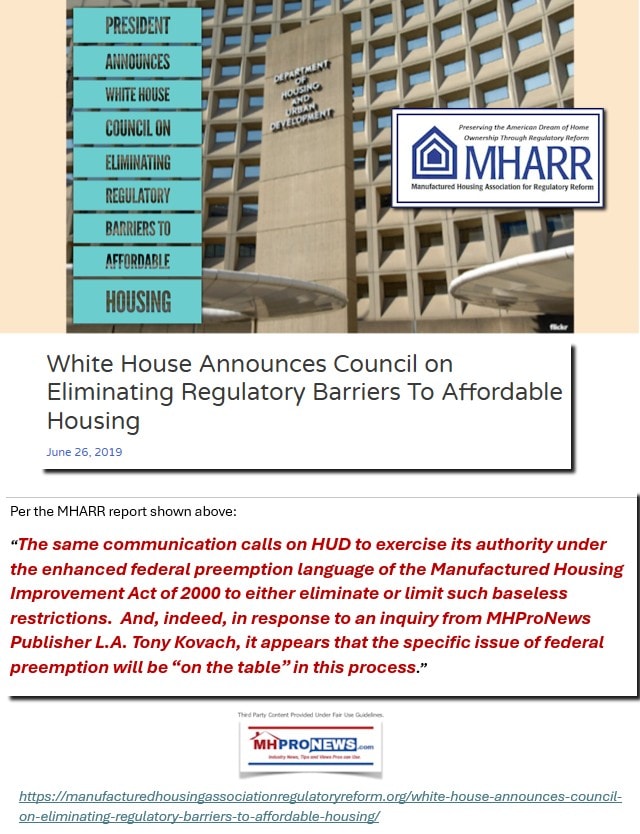
9) Compared to what Joe Biden (D) and Kamala Harris (D) did on that topic, “on the table” from a Trump White House staffer is better than HUD Secretary Marcia Fudge flatly effectively saying no to enforcing federal preemption for manufactured housing enabling legislation that then Senator Joe Biden (DE-D) co-sponsored.

10) Variations on the “Smear” directed at Trump, Musk, Bannon or whomever ought to be spotted for what it is — and if unwarranted, it should be dismissed.

11) Layton is among those who failed to mention, the 2000 Reform Law, federal preemption, and the Duty to Serve Manufactured Housing (DTS) financing. The solution to much of what has gone wrong in Washington, D.C. from. The effect of failure to enforce the law, as Schmitz pointed out in the quote shown above, is that companies with deeper pockets in manufactured housing were able to gobble up smaller firms. The oligarchs in or beyond manufactured housing are better able to expand while smaller firms are pummeled by costly regulatory policies.

12) Given the steps taken in Trump 1.0, there are reasons to think that Trump 2.0 could be as or more successful at regulatory cuts and enforcement of good existing laws. MHARR can be counted on to press good existing laws and may well have a warmer reception than the nearly four years under Biden-Harris yielded.
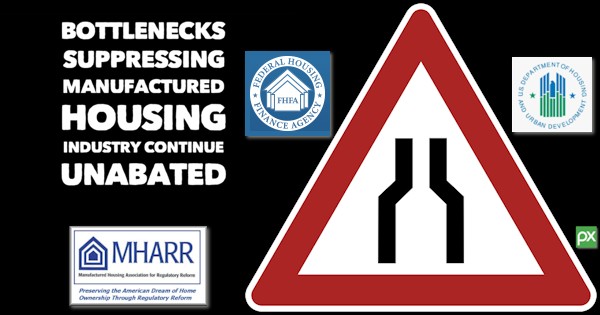
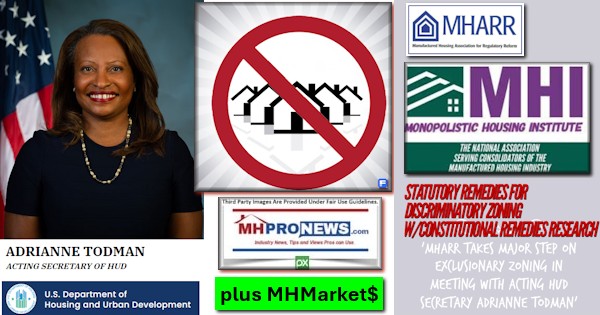
13) The Manufactured Housing Institute (MHI) has been repeatedly called out for posturing one thing while doing another, all while the consolidation of the industry occurs in a fashion that routinely benefits its larger members.




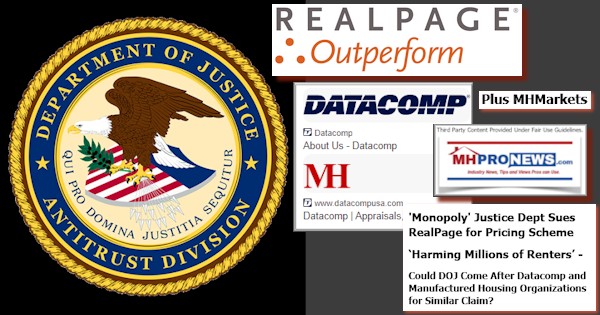


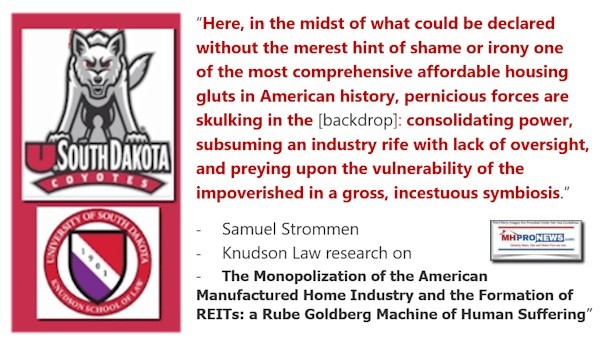

14) Trump gave what has been described as a homeful and aspirational speech about the “golden age” of the country to Turning Point USA AmericaFest. He says he plans to be ready to go to work on the turnaround the afternoon he is sworn into office.
🚨‼️Turning Point Highlights: President Trump Declares a New Era
“Standing before you today, I can proudly proclaim that the Golden Age of America is upon us.”
🎥: Turning Point USA pic.twitter.com/3h7MKID9QY
— Kristy Tallman (@KristyTallman) December 22, 2024
FULL: President Trump’s Remarks at Turning Point USA’s AmericaFest in Phoenix, Arizona pic.twitter.com/d87muqJGLK
— Trump War Room (@TrumpWarRoom) December 22, 2024
15) Stoller and others in the antitrust movement are significant and at times useful voices in explaining what has gone wrong in this or that market. The lack of affordable housing has cost the U.S. trillions of dollars annually in cumulative lost productivity (see below). But several need to refine their lens and sharpen their factual focus. MHProNews will monitor and report as deemed warranted.
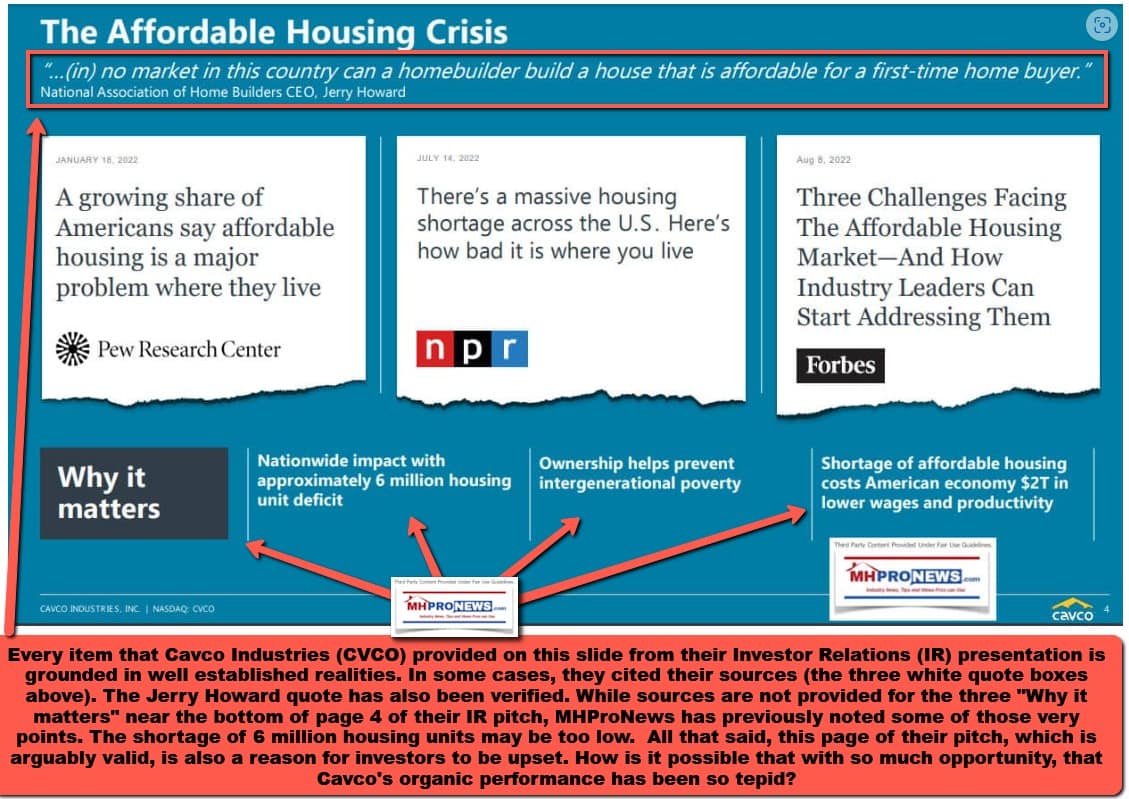


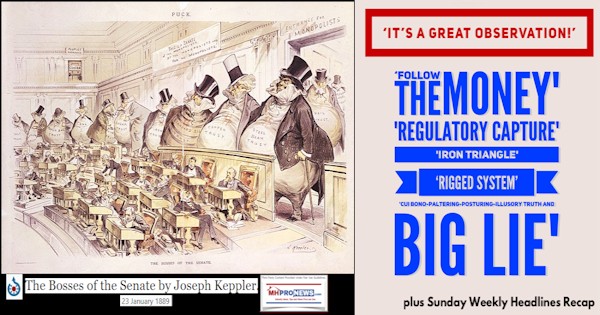





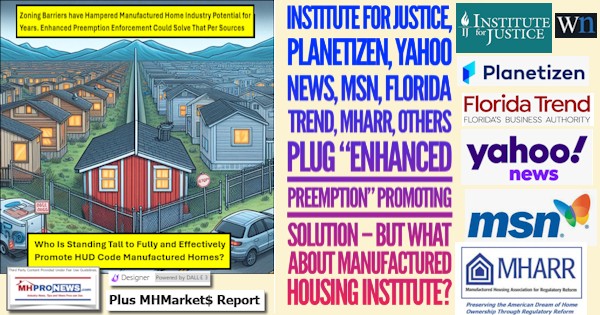

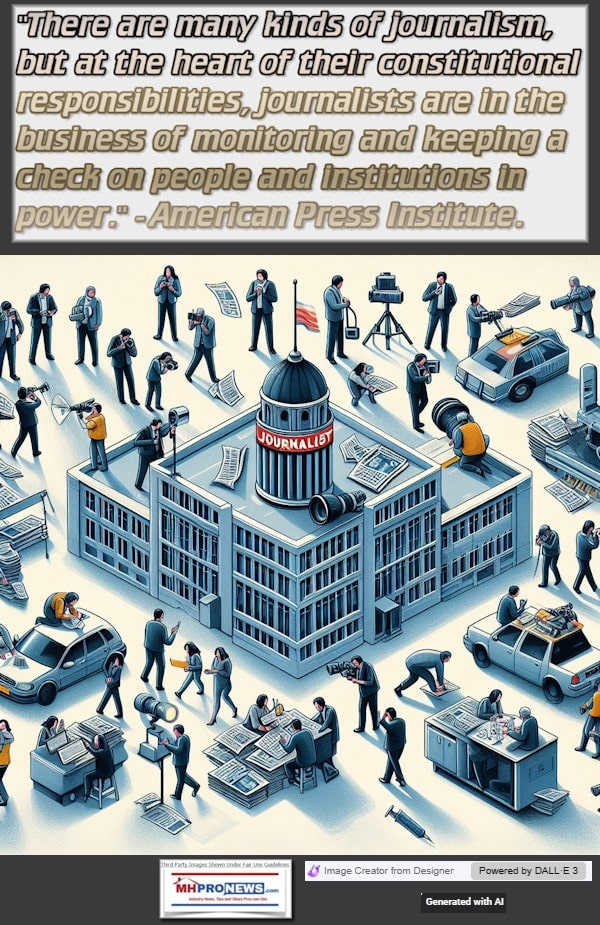


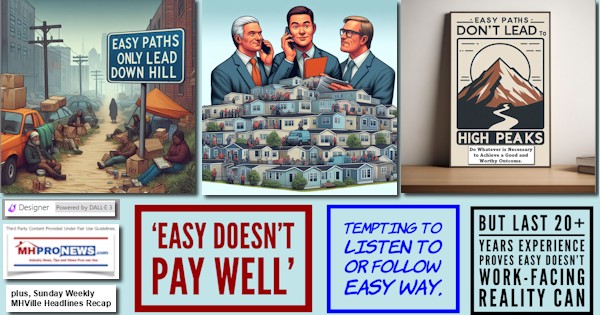
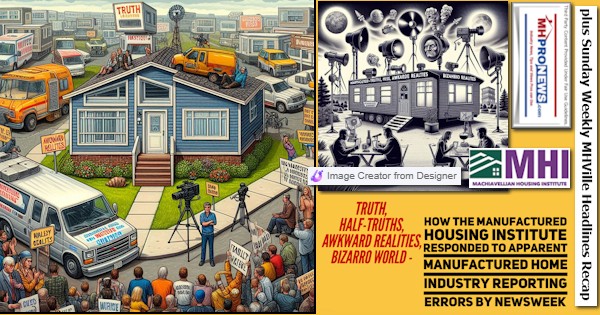
Again, our thanks to free email subscribers and all readers like you, as well as our tipsters/sources, sponsors and God for making and keeping us the runaway number one source for authentic “News through the lens of manufactured homes and factory-built housing” © where “We Provide, You Decide.” © ## (Affordable housing, manufactured homes, reports, fact-checks, analysis, and commentary. Third-party images or content are provided under fair use guidelines for media.) See Related Reports, further below. Text/image boxes often are hot-linked to other reports that can be access by clicking on them.)

By L.A. “Tony” Kovach – for MHProNews.com.
Tony earned a journalism scholarship and earned numerous awards in history and in manufactured housing.
For example, he earned the prestigious Lottinville Award in history from the University of Oklahoma, where he studied history and business management. He’s a managing member and co-founder of LifeStyle Factory Homes, LLC, the parent company to MHProNews, and MHLivingNews.com.
This article reflects the LLC’s and/or the writer’s position and may or may not reflect the views of sponsors or supporters.
Connect on LinkedIn: http://www.linkedin.com/in/latonykovach
Related References:
The text/image boxes below are linked to other reports, which can be accessed by clicking on them.’

